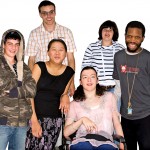
Poor communication between people with learning disabilities, their carers and health professionals has been cited as an element of the explanation of health inequalities faced by people with learning disabilities.
In his debut blog, Tom Crossland looks at one study which used actors with learning disabilities as ‘standardised patients’ in the training of medical students in order to see if this might improve communication and diagnostic skills.
[read the full story...]







